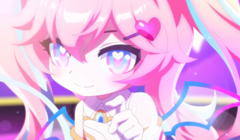Darim, an animator for the game MapleStory, finds herself under attack from a male gaming community who misconstrue her character's gesture as a feminist statement, leading to a shocking barrage of online abuse. This incident not only underscores the rising tide of anti-feminism in South Korea's gaming culture but also reflects broader societal issues facing women advocating for their rights.
Rising Anti-Feminism: A Young Animator's Disturbing Encounter in the Gaming World

Rising Anti-Feminism: A Young Animator's Disturbing Encounter in the Gaming World
A South Korean animator faces death threats and public backlash over a perceived feminist gesture in a popular video game, revealing alarming trends of anti-feminist harassment.
---
It was a seemingly ordinary night when Darim, an animator for MapleStory, one of South Korea's leading video games, decided to showcase her latest work. Excited to share a promotional trailer featuring a newly designed character, she posted it onto social media, completely unaware of the storm it would unleash. Within moments, she was inundated with a torrent of vitriol, death threats, and demands for her termination, all stemming from a single frame in which the character made a gesture misinterpreted as a feminist symbol.
The hand gesture, which consisted of the character holding her fingers close together, ignited outrage among young male gamers who associated it with a historical online feminist movement that had once mocked Korean men's anatomy. Darim recounted the horror: "There were insults I'd never heard before, they were disgusting and inhumane," she said, reflecting on the depths of the abuse. The backlash escalated quickly as Nexon, the game publisher, swiftly pulled the trailer, capitulating to the angry mob.
This incident highlights a growing and alarming backlash against feminism in South Korea, where publicly identifying as a feminist can lead to severe repercussions. Darim's case is not an isolated incident; it's part of a broader trend where male gamers target women in the industry, bombarding them with abuse and seeking to ruin their careers for alleged feminist views. Minsung Kim, a 22-year-old male gamer and activist, expressed concern over the destructive nature of these witch hunts, remarking, "They decide that a dark, evil feminist is hiding, and her life should be ruined."
The fear and apprehension felt by women in South Korea are palpable, as the climate of hostility has forced many feminists to retreat into silence. This societal shift is magnified by the recent rise in anti-feminist sentiment, with major corporations yielding to the demands of vocal minority groups that threaten to boycott or damage their reputation. As Darim watched her studio grapple with the fallout, she was terrified of losing her job and tarnishing her career in animation forever.
In the backdrop of this ongoing upheaval, cultural anthropologists and sociologists have begun to explore the complex dynamics at play. They suggest that resentment towards women's advancements and the fear of loss among young men may fuel these aggressive anti-feminist movements. The mid-2010s saw women protesting against sexual violence and harassment, which left a lasting impact, prompting many men to view feminism as a direct challenge to their standing.
Compounding these challenges, even the police have shown reluctance to protect women like Darim, refusing to take her reports of abuse seriously until public outrage pressured them to investigate. Such responses from authority figures exacerbate the culture of fear that deters women from embracing their feminist beliefs.
The issue extends beyond the digital realm; real-life violence has also surged, as shown in the case of Jigu, who was attacked for her appearance. She recounted a horrific encounter with a man who targeted her specifically for looking like a feminist, highlighting the risks women face when they defy societal expectations. Her attacker was linked to a radical anti-feminist group, and in a rare judicial acknowledgment of the crime's misogynistic nature, he received a three-year prison sentence.
As the gaming industry reconfigures itself to placate the male-dominated audience, seasoned professionals find themselves modifying their designs to avoid perceived feminist symbolism altogether, revealing the chilling effects of such ideological witch hunts. Critics argue that these anti-feminist factions have become increasingly organized, weaponizing common gestures to create an environment rife with surveillance and intimidation.
Minsung Kim, once a participant in these anti-feminist communities, has since transformed and now stands alongside women advocating for their rights. His personal journey mirrors a need for broader awareness and education, emphasizing that merely holding a hand in a specific way should not subject anyone to vitriol or harassment.
As Darim and others navigate this landscape, they seek allies and the courage to advocate for change. With increased activism and exposure, there is hope that the tide will shift. Legal reforms are being discussed, but many hurdles remain given the sociopolitical climate in South Korea where feminism is often met with hostility.
In an era where even the slightest gesture can spark outrage, the stories of those battling for equality are critical in reshaping perceptions and advocating for a future where femininity and feminist beliefs are not only accepted but celebrated.
It was a seemingly ordinary night when Darim, an animator for MapleStory, one of South Korea's leading video games, decided to showcase her latest work. Excited to share a promotional trailer featuring a newly designed character, she posted it onto social media, completely unaware of the storm it would unleash. Within moments, she was inundated with a torrent of vitriol, death threats, and demands for her termination, all stemming from a single frame in which the character made a gesture misinterpreted as a feminist symbol.
The hand gesture, which consisted of the character holding her fingers close together, ignited outrage among young male gamers who associated it with a historical online feminist movement that had once mocked Korean men's anatomy. Darim recounted the horror: "There were insults I'd never heard before, they were disgusting and inhumane," she said, reflecting on the depths of the abuse. The backlash escalated quickly as Nexon, the game publisher, swiftly pulled the trailer, capitulating to the angry mob.
This incident highlights a growing and alarming backlash against feminism in South Korea, where publicly identifying as a feminist can lead to severe repercussions. Darim's case is not an isolated incident; it's part of a broader trend where male gamers target women in the industry, bombarding them with abuse and seeking to ruin their careers for alleged feminist views. Minsung Kim, a 22-year-old male gamer and activist, expressed concern over the destructive nature of these witch hunts, remarking, "They decide that a dark, evil feminist is hiding, and her life should be ruined."
The fear and apprehension felt by women in South Korea are palpable, as the climate of hostility has forced many feminists to retreat into silence. This societal shift is magnified by the recent rise in anti-feminist sentiment, with major corporations yielding to the demands of vocal minority groups that threaten to boycott or damage their reputation. As Darim watched her studio grapple with the fallout, she was terrified of losing her job and tarnishing her career in animation forever.
In the backdrop of this ongoing upheaval, cultural anthropologists and sociologists have begun to explore the complex dynamics at play. They suggest that resentment towards women's advancements and the fear of loss among young men may fuel these aggressive anti-feminist movements. The mid-2010s saw women protesting against sexual violence and harassment, which left a lasting impact, prompting many men to view feminism as a direct challenge to their standing.
Compounding these challenges, even the police have shown reluctance to protect women like Darim, refusing to take her reports of abuse seriously until public outrage pressured them to investigate. Such responses from authority figures exacerbate the culture of fear that deters women from embracing their feminist beliefs.
The issue extends beyond the digital realm; real-life violence has also surged, as shown in the case of Jigu, who was attacked for her appearance. She recounted a horrific encounter with a man who targeted her specifically for looking like a feminist, highlighting the risks women face when they defy societal expectations. Her attacker was linked to a radical anti-feminist group, and in a rare judicial acknowledgment of the crime's misogynistic nature, he received a three-year prison sentence.
As the gaming industry reconfigures itself to placate the male-dominated audience, seasoned professionals find themselves modifying their designs to avoid perceived feminist symbolism altogether, revealing the chilling effects of such ideological witch hunts. Critics argue that these anti-feminist factions have become increasingly organized, weaponizing common gestures to create an environment rife with surveillance and intimidation.
Minsung Kim, once a participant in these anti-feminist communities, has since transformed and now stands alongside women advocating for their rights. His personal journey mirrors a need for broader awareness and education, emphasizing that merely holding a hand in a specific way should not subject anyone to vitriol or harassment.
As Darim and others navigate this landscape, they seek allies and the courage to advocate for change. With increased activism and exposure, there is hope that the tide will shift. Legal reforms are being discussed, but many hurdles remain given the sociopolitical climate in South Korea where feminism is often met with hostility.
In an era where even the slightest gesture can spark outrage, the stories of those battling for equality are critical in reshaping perceptions and advocating for a future where femininity and feminist beliefs are not only accepted but celebrated.





















